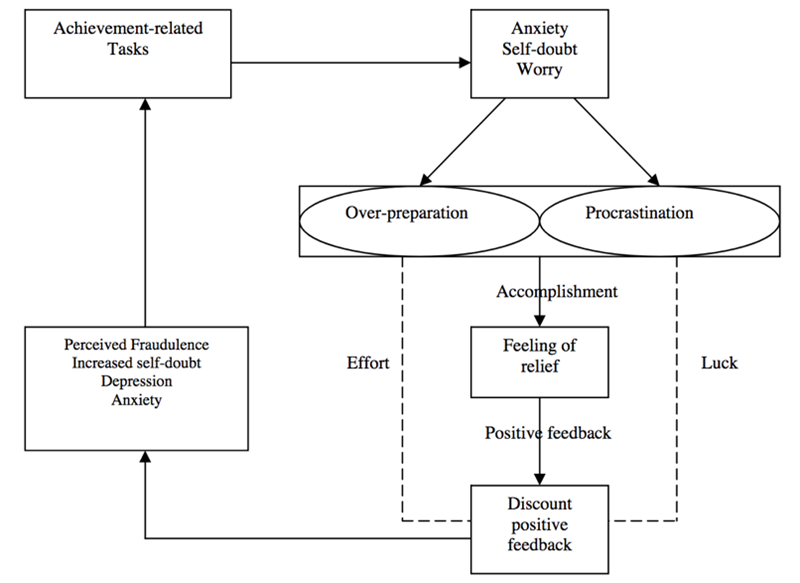
“I don’t deserve this success.”
“I’m just lucky.”
“There are other people better than me. I’m not skilled enough.”
Do all of the above sound like you, whenever something good happens? Now, if the answer is yes, that’s could actually be your imposter syndrome talking.
While it can feel more like being humble and down-to-earth, the truth is that it’s literally what this condition is all about.
From the Merriam-Webster dictionary, this is defined as “...a false and sometimes crippling belief that one's successes are the product of luck or fraud, rather than skill.” Essentially, someone with imposter syndrome will feel like their accomplishments happen merely because of good fortune.
Some say it could be caused by being brought up in families who place a higher value on achievements. Coupled with the societal pressure to achieve, excel, and stay modest, it can strain individuals as they evaluate their self-worth based on what they’ve achieved.
Imposter syndrome can affect anyone regardless of their level of education, expertise, or even social status. At work, it's especially prevalent among high performers and the process of imposter thoughts is known as an ‘imposter cycle’ (see diagram below).

When given an achievement-related task, an individual with imposter syndrome may face anxiety, self-doubt, and worry. This leads to that person becoming over-prepared, or start procrastinating.
Once the task is completed, naturally, it is followed by relief and positive feedback. However, the individual may feel that all this is only due to either high effort (over-preparation) or sheer luck (procrastination). This discounts the positive feedback, causing the person to feel perceived fraudulence, increased self-doubt, depression, and anxiety.
If not managed properly, imposter syndrome can lead to self-sabotage and feelings of low self-worthiness, not just at work, but in their personal lives too. Studies report that at least 70% of people have experienced imposter syndrome at least once in their career.
It may seem like it's a never-ending spiral of 'get task > get lucky > get job done > get imposter syndrome > rinse and repeat'. However, we're here to tell you that this can actually be managed, and it all starts with you! Here's the little steps that you can do to start managing this sort of thought process better:

List down your experiences, skills, the problems you have solved, and the projects you have led. These are the fruits of your labour and something you accomplished yourself. And, get this, these are all real, unlike the fantasy impression of being an imposter!
The main takeaway of this activity is to be aware of your own goals and achievements without any comparison. This way, you’ll be able to take a step back and see for yourself what makes you special, and ask the person in the mirror, “Are you really an imposter?”

It's actually quite alright to feel depressed, anxious, insecure, confused, frustrated, or even angry at yourself. Emotions are what makes us human, and keeps us continually evolving. Permit yourself to acknowledge them and the space to own them.
When this happens, write down how you feel so you can reflect on how it affects you emotionally. This exercise helps you identify signs of imposter syndrome so you can tackle it better in the long run.

Reframing the negative messages we tell ourselves to positive ones rewrites our mindset and outlook. Not only does it make us feel better, but we become more mindful of our thoughts and narratives.
Instead of “It only happened because of luck,” or “Other people are better than me,” turn it into words of positive affirmation like “I put in a lot of effort,” or “I am better than merely 'good enough'.”

When we compare, we don’t just create feelings of inadequacy and low self-esteem. We actually end up perceiving ourselves as constantly being lesser than everyone else, and never good enough.
Instead of inducing self-sabotage, the only comparison you should make is between you and yourself, and outdo your own successes. Everyone is running their race, and remember, nobody is your toughest competition but you!

Without a strong support network, all the effort of instilling positive mindfulness and determination can crumble easily. Surround yourself with people who can uplift, reassure, motivate, and provide support – whether they’re your immediate teammates, industry acquaintances, or a new club you’ve begun.
A simple little exercise that you can carry out is to ask yourself how you might best encourage your support network who keeps downplaying their accomplishments, and then applying that same supportive language on your ownself!
If overcoming imposter syndrome sounds challenging and frightening, you’re not alone. After all, celebrities like David Bowie, Serena Williams, Tina Fey, Natalie Portman, Emma Watson, Tom Hanks, and Maya Angelou have once confessed to feeling like a fraud before!
That question sounds like it's quite the ridiculous thing to ask, but remember, every cloud has a silver lining (if you look hard enough)! Imposter syndrome is exhausting to tackle, but can be beneficial, if managed appropriately and with the proper coping mechanics.

As it commonly affects high achievers, working with an imposter (or two) means you’re part of a highly-intelligent, driven team. It also indicates that you’re constantly challenging yourself – by exploring beyond your comfort zone and pursuing growth.
Feelings of being an imposter can be confused with humility and respect, but that’s actually a good thing. It keeps your self-confidence in check and prevents feelings of superiority or ego. Hence, you are less likely to take opportunities or new experiences for granted.
Your interpersonal performance at work may also improve, thanks to imposter syndrome. When employees feel their level of competence is lower than what others think, they are encouraged to prove themselves interpersonally by helping and cheering others on.
Imposter feelings are mainly driven by emotions and opinions rather than objectivity. When you eliminate the former two and consider all the concrete data in your hands, you realise that your achievements are warranted and purposeful.
Learning to embrace imposter syndrome and using it to your advantage is a long journey. When in doubt, remember that your feelings are completely valid and go as you can, so long as you don't stop.